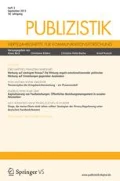Literatur
Bandura, A. (1986). Social foundations of thought and action: A social cognitive theory. Englewood Cliffs: Prentice Hall.
Deci, R. M., & Ryan, E. L. (2000). Self-determination theory and the facilitation of intrinsic motivation, social development, and well-being. American Psychologist, 55(1), 68–78.
Deresiewicz, W. (2009). The end of solitude. The Chronicle Review. http://chronicle.com/article/The-End-of-Solitude/3708. Zugegriffen: 19. März 2015.
Döbler, T. (2014). Das Ende der Verbindlichkeit? Veränderungen sozialer Beziehungen durch mobiles Kommunikationsverhalten. In J. Wimmer & M. Hartmann (Hrsg.), Medienkommunikation in Bewegung. Mobilisierung – Mobile Medien – Kommunikative Mobilität (S. 139–154). Wiesbaden: Springer VS.
Gigerenzer, G. (2007). Gut feelings: The intelligence of the unconscious. New York: Penguin.
Hasebrink, U., & Domeyer, H. (2012). Media repertoires as patterns of behaviour and as meaningful practices. A multimethod approach to media use in converging media environments. Participations, 9, 757–779.
Hefner, D. (2012). Alltagsgespräche über Nachrichten. Medienrezeption, politische Expertise und die wissensbildende Qualität von Anschlusskommunikation. Baden-Baden: Nomos.
Kalman, Y. M., & Rafaeli, S. (2011). Online pauses and silence: Chronemic expectancy violations in written computer-mediated communication. Communication Research, 38, 54–69. doi:10.1177/0093650210378229 .
Klein, V. (2014). Gemeinsam einsam: Phänomen Phubbing. Untersuchungen zur unangebrachten Smartphone-Nutzung im privaten und öffentlichen Miteinander. Information – Wissenschaft & Praxis, 65(6), 335–340.
Knobloch, S., & Zillmann, D. (2002). Mood management via the digital jukebox. Journal of Communication, 52, 351–366.
Krämer, N. C., & Winter, S. (2008). Impression management 2.0. Journal of Media Psychology, 20, 106–116.
Lee, C. S., & Ma, L. (2012). News sharing in social media: The effect of gratifications and prior experience. Computers in Human Behavior, 28, 331–339.
Meares, R., & Orlay, W. (1988). On self‐boundary: A study of the development of the concept of secrecy. British Journal of Medical Psychology, 61, 305–316.
Medienpädagogischer Forschungsverbund Südwest. (2014). Jugend, Information, Multimedia (JIM-Studie) 2014. Stuttgart: MPFS.
Muise, A., Christofides, E., & Desmarais, S. (2009). More information than you ever wanted: Does facebook bring out the green-eyed monster of jealousy? CyberPsychology & Behavior, 12, 441–444.
Page, R. (2010). Re-examining narrativity: Small stories in status updates. Text & Talk, 30, 423–444.
Schultz, N. (2015). Computer und Gehirn: Der Mythos von der digitalen Demenz. Spiegel Online. http://www.spiegel.de/wissenschaft/mensch/computer-und-gehirn-der-mythos-von-der-digitalen-demenz-a-1008229.html. Zugegriffen: 17. Feb. 2015.
Sonnentag, S., & Bayer, U.-V. (2005). Switching off mentally: Predictors and consequences of psychological detachment from work during off-job time. Journal of Occupational Health Psychology, 10, 393–414.
Thatcher, A., Wretschko, G., & Fridjhon, P. (2008). Online flow experiences, problematic Internet use and Internet procrastination. Computers in Human Behavior, 24, 2236–2254.
Trepte, S., & Reinecke, L. (2013). The reciprocal effects of social network site use and the disposition for self-disclosure: A longitudinal study. Computers in Human Behavior, 29, 1102–1112. doi:10.1016/j.chb.2012.10.002 .
Turkle, S. (2011). Alone together: Why we expect more from technology and less from each other. New York: Basic Books.
Valkenburg, P. M., & Peter, J. (2008). Adolescents’ identity experiments on the Internet: Consequences for social competence and self-concept unity. Communication Research, 35, 208–231.
Vorderer, P., & Kohring, M. (2013). Permanently online: A challenge for media and communication research. International Journal of Communication, 7, Feature, 188–196.
Vorderer, P., & Schneider, F. (in Druck). Social media and ostracism. In K. D. Williams & S. A. Nida (Hrsg.), Social exclusion. New York: Psychology Press.
Wang, Z., & Tchernev, J. M. (2012). The „myth“ of media multitasking: Reciprocal dynamics of media multitasking, personal needs, and gratifications. Journal of Communication, 62, 493–513.
Wegner, D. M., Erber, R., & Raymond, P. (1991). Transactive memory in close relationships. Journal of Personality and Social Psychology, 61, 923–929.
Ziegele, M., Breiner, T., & Quiring, O. (2014). What creates interactivity in online news discussions? An exploratory analysis of discussion factors in user comments on news items. Journal of Communication, 64, 1111–1138.
Author information
Authors and Affiliations
Corresponding author
Additional information
An diesem Essay war folgendes Autorenteam beteiligt: Christoph Klimmt (Hochschule für Musik, Theater und Medien Hannover), Diana Rieger (Universität Mannheim), Eva Baumann, Dorothée Hefner (beide Hochschule für Musik, Theater und Medien Hannover), Karin Knop (Universität Mannheim), Nicola Krömer (Universität Erfurt), Jutta Mata (Universität Mannheim), Thilo von Pape (Universität Hohenheim), Thorsten Quandt (Universität Münster), Sabine Reich (Universität Mannheim), Leonard Reinecke (Universität Mainz), Sabine Trepte (Universität Hohenheim), Sabine Sonnentag, Hartmut Wessler (beide Universität Mannheim).
Rights and permissions
About this article
Cite this article
Vorderer, P. Der mediatisierte Lebenswandel. Publizistik 60, 259–276 (2015). https://doi.org/10.1007/s11616-015-0239-3
Published:
Issue Date:
DOI: https://doi.org/10.1007/s11616-015-0239-3

